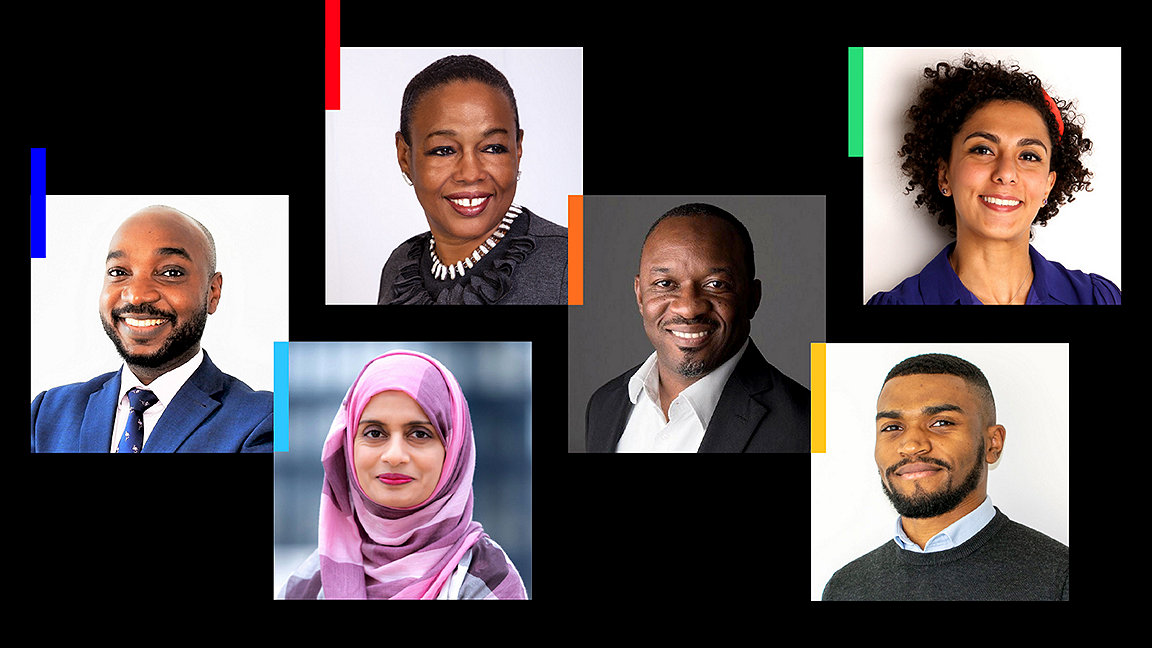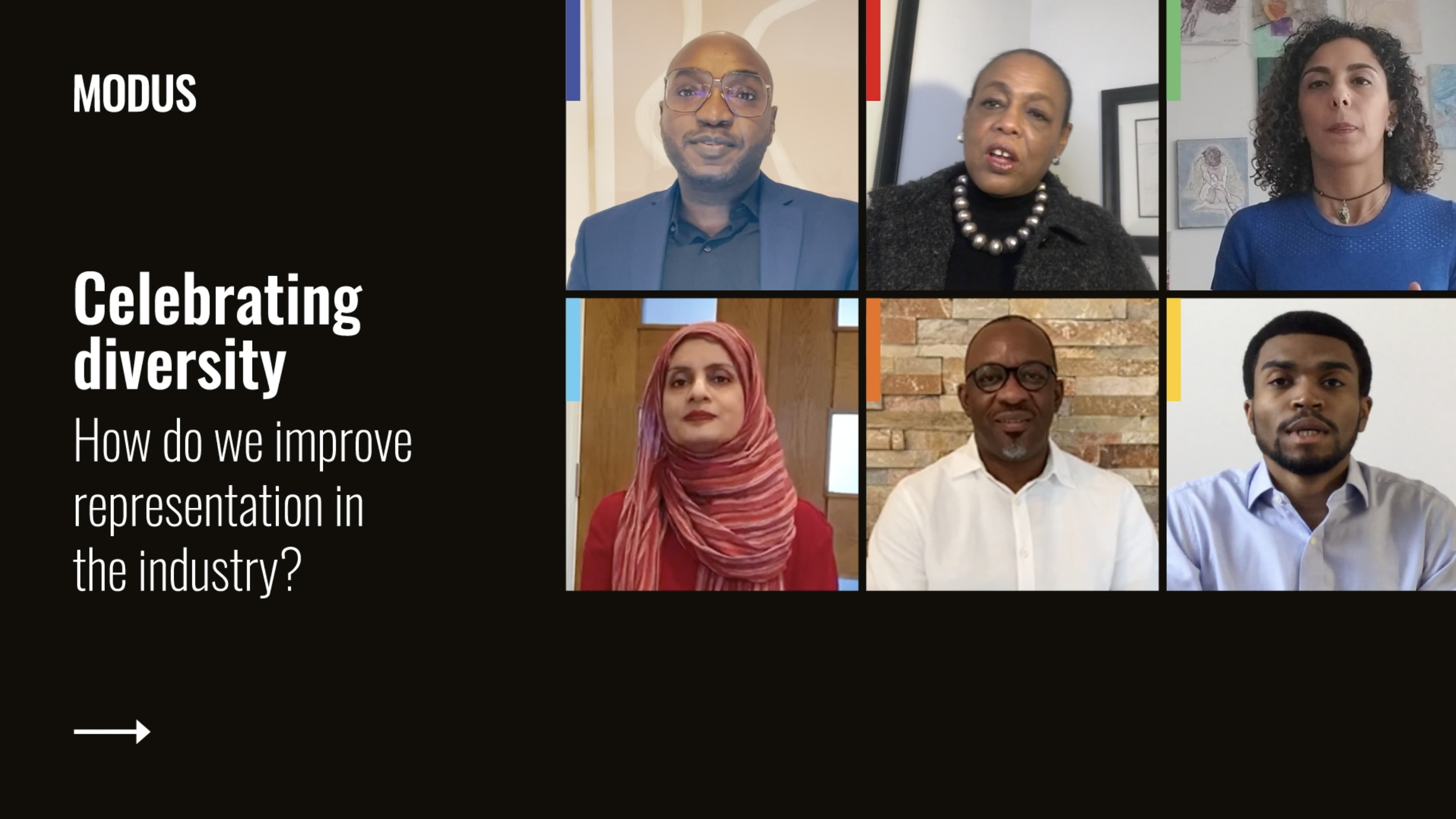
From left to right: Yunus Aminu MRICS, Saba Nayab FRICS, Alvah Beander MRICS, Uche Obi FRICS, Jonah Speaks, Ayda Chamcham MRICS
As part of a new initiative to increase the visibility of ethnically diverse RICS members, and build a fairer, more inclusive industry, RICS has convened a diversity and inclusion panel. It aims to draw together professionals working across different jurisdictions to steer thinking about how to encourage and support existing RICS members, as well as encourage more people from ethnic minorities into surveying jobs.
Modus spoke to six contributors to find out why they think the industry could be doing more, and hear their hopes for the year ahead.
1. Jonah Speaks, assistant project surveyor, BAM Construction, UK
2. Uche Obi FRICS, government chief valuation officer, The Cayman Islands
3. Alvah Beander MRICS, founder, Melanin Art Appraisals LCC, US
4. Yunus Aminu MRICS, director at Provis, UAE
5. Ayda Chamcham MRICS, founder, Consultation Chamcarré, Canada
6. Saba Nayab FRICS, principal sponsor Nine Elms, Transport for London, UK


Why did you decide to get involved in this initiative?
Jonah: I’ve been involved in similar initiatives in my company. I was asked to chair our employee resource group that focuses on ethnic minorities, and I thought it would be good to understand what RICS was doing so we could potentially align and exchange some ideas.
Saba: For me, this initiative felt like the first time someone was asking me to speak from a diversity perspective, and we were being encouraged to open up. We tend to assimilate, to blend in with everyone else, and now we’re being asked what distinguishes us and that’s really important.
Uche: When I moved to the UK I found it hard to get a job because there were limited opportunities for black professionals. At the time, Nigerians had a bad reputation, so I had to tweak my CV to reflect my UK experience, and I changed my name to one that sounded more English. After that I did get some interviews, but it was still hard to find a job.
Now I want to give the people following me a chance. For example, when you go in for an APC assessment you’re likely to see white males interviewing you: I want to be able to help candidates come forward and make sure there are more assessors from diverse backgrounds.
Alvah: It’s similar for me. In the 1970s when I was a student we invited Shirley Chisholm, an American politician, to speak and the thing I got was representation. This tiny black woman was standing up there saying she wanted to be president, and what is etched in my soul is how serious she was and how purposeful she was. I have had a fantastic career and I have tried to give back - there have been such amazing doors open to me that I’m pinching myself sometimes.
I was the president of the DC chapter of the American Society of Appraisers, and through that I helped seven African American people become appraisers. Seven doesn’t sound like very much, but when I was starting out there were two of us, maybe three in total. And today things really don’t look much different.
Yunus: I think that idea of representation is really important. When I talk to people with my background there is a perception that RICS is a very British organisation that isn’t for ‘us’. So being involved in something like this means someone could open a link to something and see me talking.
Saba: When I arrived at University to do my degree I was out of my depth. It was a whole world I knew nothing about, there were no role models at all. A lot of the people who were on the course, their parents owned part of this or that estate and I was one of only a handful of non-whites.
Ayda: I’m Moroccan born, and I experienced racism in France so I know what it is to be an outsider in the field. After I moved to Canada I found that the racism wasn’t as explicit as in France, but in Canada it’s more underhand. I want to create awareness within the industry and help organisations think that they can be diverse and inclusive.
“I want to be able to help candidates come forward and make sure there are more assessors from diverse backgrounds.” Uche Obi FRICS, Cayman Islands government, Cayman Islands
%2022%20Feb.jpg)
Are things improving for ethnic minority professionals?
Jonah: I think there is progress being made, slowly but surely. I think the attitude among senior managers has shifted to acknowledge that it’s something we should be doing, rather than something that is being forced on them. And the younger generation coming through don’t like to see injustices, or massive inequalities in terms of pay and progression, and those younger voices are starting to speak up.
Ayda: Added to that, people from diverse backgrounds often think differently to the status quo; they can create another perspective and that has to be a good thing
Yunus: If someone looks at the leadership in the industry and just sees white men then they might assume that these are the only people who get far in this profession. This needs to be addressed because a lot of young professionals want to pick something that they can succeed in, and it’s about giving people hope that if you work hard you can get somewhere.
Saba: I agree - people need to see role models, to see something to aspire to. I once did a photo shoot for a magazine where I was pictured in my hijab, with a hard hat on, and someone told me that their teenage daughter had seen it and said “are we allowed to do jobs like that?” And I thought that was really powerful.
Uche: The fact that we’re speaking about this at all is a plus. And diversity and inclusion is now one of the competencies you need to study for, as an APC candidate - although that is just for level one and I think it should be up to level three. I also think members should be required to do a diversity and inclusion competency study every three years.
Alvah: We need to get black young people a seat at the table - they need to be on committees and forums, they need to be invited. But once you get a seat at the table you need mentoring to help you understand how to operate in those environments. People need to be appointed by RICS to be in those roles, and then whatever the initiatives are, there needs to be accountability in place, and a system to audit the processes.
%2022%20Feb.jpg)
Do you think there is any value in targeted recruitment campaigns, or visiting schools?
Ayda: Schools are educating the leaders of tomorrow, so if we’re not in those schools telling the pupils what is going on in the industry then we will miss out.
Jonah: Yes I think a lot of people in construction get into it via friends or family. That’s not necessarily a bad thing, but we should be casting the net a bit wider than the traditional places. It’s about explaining the possibilities that are out there - it’s not just bricklaying, there’s loads of work in Building Information Modelling and modular design and so on - and really trying to sell it. I don’t think there are many initiatives out there doing that yet.
Uche: Kids aren’t sure what we do - but if someone’s dad is a chartered surveyor and he tells his friends what his dad does, that’s the exposure. At the moment I think a lot of the promotional material we have is quite UK-focused and I would like it to be wider.
Yunus: It could be tied into mentorship. At the start of my career I struggled to get mentorship, partly because at the time facilities management was a fairly new discipline, and there was hardly a single black person who was in a position of leadership. Having someone with a similar background to yourself often helps in understanding what you need to do to get to the next level.
Alvah: I’d also suggest doing some reverse mentoring - we’re trying to create the future, and we have to have a new playbook.
Saba: Actually, one of the things we’ve done [at TFL] is set up a sort of reverse mentoring programme where we talk to senior managers about our experience, so that they can understand what it’s like for us. Incidentally when I was at school, no one could tell me what a degree in estate management was - not even the careers advisor.
“We need to get black young people a seat at the table - they need to be on committees and forums, they need to be invited.” Alvah Beander MRICS, Melanin Art Appraisals LCC, America
%2022%20Feb.jpg)
What do you think should be the priorities for the industry in the next 12 months?
Yunus: I’m having a lot of meetings with clients to try and solve the new problems that COVID-19 has thrown up. A lot of organisations have changed their operating models and there’s an increased focus on health and safety; even sending facilities management teams into buildings has become more complicated. We’re looking at how technology can improve that without needing to send physical bodies in.
Ayda: I think we need to think about the cities of the future, so that the design of buildings can accommodate multiple uses. In hospitality in particular, we will see the usage change to adjust to demand, such as hotels which can be turned into hospital rooms. I think we will see more and more outdoor tourism, and once the business travellers return they will be spending lots because people will enjoy the networking face-to-face again.
Saba: Companies just don’t need as much space as they needed before, and there is so much more that needs to be done on wellbeing, particularly if people keep working from home. I do think this situation has flattened the hierarchies: everyone’s in the same position, so that seniority has just been pushed down a bit. That’s got to be a good thing.
Jonah: We must focus on reducing carbon emissions across the industry, and that should create some more jobs. I also think we should be prioritising modernisation; we’re still reliant on the skill sets of our senior leaders, but we can modernise that in a way that doesn’t leave that skill set behind and incentivises younger people to get involved.
Uche: Yes, I definitely think the industry has been slow to adopt technology in the way we do things. I’m not fearful of my job as things change - I think it will allow me to do my job better. I’m also excited for the work being done by RICS on racial diversity - I hope it will be able to do something similar to the work it’s already done on gender.
Alvah: I think we need to be doing a lot of asking and listening in order to do that though, and when you invite more people to the table it is going to be more cumbersome and challenging. But think of someone like the inauguration poet, Amanda Gorman - look at what happened when she was given a platform. We have our own Amanda Gormans, and we haven’t allowed them to get onto that podium yet.
